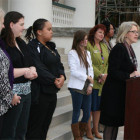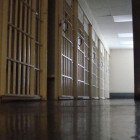
Healing Words: Creative Writing Programs as Therapy for Kids in Detention
|
ANNISTON, Ala. — Mercy Pilkington’s classroom, at first glance, seems like any other in the nation’s public school system. Novels penned by John Steinbeck and Harper Lee are stacked over a U-shaped row of cubicles. The walls are lined with laminated posters; crayon-colored cutouts of chubby red robins and lime-green pigs are pasted on the room’s sole window. Pilkington, 39, has taught for 11 years.









